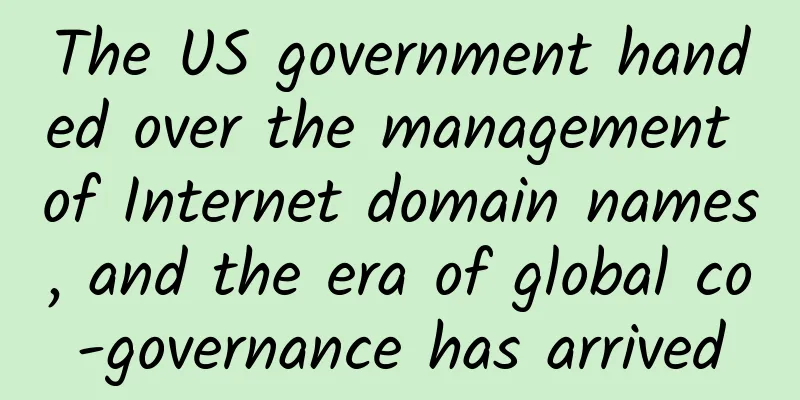The US government handed over the management of Internet domain names, and the era of global co-governance has arrived

|
Under years of pressure from the international community, the U.S. government officially handed over the management of Internet domain names to a non-profit organization on October 1, Eastern Time. This marks an important step for the Internet, which is part of people's daily lives, to move towards global governance. According to the plan, the National Telecommunications and Information Administration, an agency under the U.S. Department of Commerce , will completely hand over the management of Internet domain names to the Internet Corporation for Assigned Names and Numbers (ICANN) based in California. The authorization management contract between the two will naturally expire on October 1 and will not be renewed. "This stewardship transition will help ensure the Internet remains open, interoperable, and stable over the long term," ICANN wrote on Twitter. ICANN is a non-profit international organization founded in 1998, headquartered in California, USA. Currently, according to the contract with the National Telecommunications and Information Administration of the United States, the Internet Assigned Numbers Corporation under the agency is responsible for managing the Internet domain name management system, involving domain names, digital resources and protocol allocation. The National Telecommunications and Information Administration of the United States has the final say on how this agency operates. It is worth noting that the United States has set a precondition that is beneficial to itself for the handover, that is, it will not be handed over to the United Nations, the International Telecommunication Union or other intergovernmental organizations, but to the "global Internet multi-stakeholder community." In August this year, the National Telecommunications and Information Administration of the United States formally agreed to the handover plan submitted by ICANN. ICANN has established a non-profit public benefit corporation called Public Technical Identifiers as a subsidiary of the organization to take over the functions of the Internet Assigned Numbers Corporation. Regarding ICANN's internationalization reform, Chinese official representatives have stated in international occasions that China supports the internationalization reform of the organization and encourages Chinese Internet social organizations, enterprises, and research institutions to actively participate in the affairs of the organization. At the same time, global Internet governance should adhere to the principles of equality, openness, multi-party participation, security, trustworthiness, and win-win cooperation. Background link: Accelerating the transfer of power after the Snowden incident For a long time, the National Telecommunications and Information Administration of the United States has promised to hand over the functions of the "Internet Assigned Numbers Corporation" to the private sector, but there has been no obvious progress until the "Snowden incident" in 2013 exposed the United States' large-scale surveillance of the Internet. The US government decided to speed up the transfer process to quell the anger of the international community. On March 14, 2014, a US government agency announced that it would give up its management rights over the Internet Corporation for Assigned Names and Numbers (ICANN), but would not transfer this power to the United Nations, but to "global stakeholders." On whether the U.S. government should Giving up control of the Internet's domain name system has always been controversial in the United States. Republican presidential candidate Trump and Texas Senator Ted Cruz have both clearly expressed their opposition to giving up and urged Congress to take action, but their efforts have failed. Data·Internet Domain Name Technically speaking, the Internet domain name is just a method used in the Internet to solve the IP address correspondence problem. The Internet domain name is the name of a server or a network system on the Internet. Domain names are unique all over the world. The form of a domain name is composed of several English letters and numbers, separated by "." into several parts, such as ib". "°" is a domain name, NAMESKY.COM is an international domain name. Whether it is an international or domestic domain name, anyone who accesses the I″ι““″“ι network around the world can access it accurately. The question that follows is, has the United States really given up its control over the Internet? In fact, the US government did not "hand over power" willingly this time, but made small concessions under strong pressure from the international community. At the same time, the US government did not "hand over power" casually, but set strict preconditions, namely handing it over to the "global Internet multi-stakeholder community" and establishing a complex system of checks and balances to ensure that it still has invisible control after the formal "handover". ICANN, a non-profit international organization headquartered in California, was established in 1998. According to the contract with the National Telecommunications and Information Administration under the U.S. Department of Commerce , it is responsible for the management of the global Internet domain name system, Internet Protocol (IP) address allocation, protocol parameter configuration, and root server system management. The National Telecommunications and Information Administration has the final say on how this organization operates. Since the establishment of ICANN, the US government has promised to hand over the management of the Internet domain name system in the future, but it has always been "much ado about nothing". It was not until 2013, after the "Snowden incident" exposed that US intelligence agencies were monitoring the Internet on a large scale, that the US announced in March 2014 to accelerate the handover process in order to calm the anger of the international community. Hong Yu, an Internet research expert at the University of Southern California, said that the US government has always maintained unilateral monopoly control over the allocation of top-level Internet domain names, which constitutes a unipolar geopolitical and military deterrent force, and is therefore unpopular worldwide. The "Snowden incident" exposed the US's self-proclaimed "guardian of the open Internet" and seriously undermined its moral foundation for Internet diplomacy. At the same time, the Internet has transformed from a cutting-edge technology into a global infrastructure, and has gradually been regulated by the laws of countries around the world. Under this situation, if one country still insists on the privileges of the most basic Internet resources, it will not make much sense, but will put the US government in a passive position. These are all important factors that led to the US's final decision to "hand over power." As the National Telecommunications and Information Administration recently acknowledged in a background statement, the U.S. government's role in the management of the Internet domain name system has long "been a source of dissatisfaction for foreign governments." Some countries have therefore called for the United Nations, the International Telecommunication Union or a new intergovernmental organization to take over the management of the domain name system. "If the U.S. government does not complete this transfer of power, the calls from countries to replace the multi-stakeholder model with a multilateral government-run model will only grow louder." It should be said that after the National Telecommunications and Information Administration handed over control of ICANN, the United States' administrative intervention capabilities in domain name management were indeed greatly weakened on the surface. However, the United States has made full use of its power in the last period of time to lay the groundwork for the future evolution of I-CANN, with the "multi-stakeholder model" being the key. The so-called "multi-stakeholder model" refers to the participation of multiple parties, including academia, non-governmental organizations, industry organizations and even governments. However, in order to avoid control or "malicious takeover" by other governments or a third party after the handover, the government and intergovernmental organizations are limited to the role of policy-making advisors in the handover conditions. The governments of more than 160 countries participate as an advisory committee, and policy recommendations can only be issued after consensus is reached within the committee. Therefore, after ICANN takes over the Internet domain name management rights independently, it is more likely to move towards "privatization" rather than multilateral government operation. This does not conform to the claims of other countries in the world. Milton Miller, a professor at the Georgia Institute of Technology in the United States who has written several books on global Internet governance, believes that this Internet governance model is an "important innovation." He told Xinhua reporters: "This marks the transition from national sovereignty in cyberspace to people's sovereignty." But he also admitted that it would take time for this model to start running before we know whether it is actually feasible. It is worth noting that Internet giants will play an important role in the "multi-stakeholder model", and the United States will continue to maintain its influence through its advantages such as much stronger enterprises, hardware and software technologies, and talents than other countries. Hong Yu believes that although the "global Internet multi-stakeholder community" supports diversified participation in principle, in reality Internet companies will have great influence, so this handover has won the support of giants such as Amazon, Google, Cisco, Microsoft and Facebook, all of which are American companies. In addition, the domain name assets with the greatest commercial value, such as the largest top-level domain name ".com" and the fifth-ranked ".net", are in the hands of the American company VeriSign and will not change with this handover. "The political and economic structure of the domain name industry has not changed for the time being." In addition, the control of US law will still exist for the future Internet management . Lawrence Stricklin , director of the US National Telecommunications and Information Administration, once said that ICANN "has always been and will continue to be subject to (US) antitrust laws." The handover plan also clearly stated that the agency's headquarters will still be located in California and must comply with local laws. Obviously, in the process of transferring the management rights of Internet domain names, the applicable law is a focus of discussion. Miller pointed out that the influence of the US government, especially the law enforcement and administrative agencies, on ICANN is indeed decreasing, but US law will continue to affect this organization. He further explained that ICANN is an international organization, so once any behavior is considered to create or increase monopoly, it may not only be subject to antitrust investigation in the United States, but also in China or Europe. In the long run, it remains unknown whether ICANN will be able to establish a parallel organization outside the United States, such as in Switzerland, to enhance its international legitimacy. It can be seen that the United States’ “handing over power” has taken a step towards global governance of the Internet, but the Internet still has a long way to go and many challenges to face if it wants to truly break free from the invisible control of the United States. As a winner of Toutiao's Qingyun Plan and Baijiahao's Bai+ Plan, the 2019 Baidu Digital Author of the Year, the Baijiahao's Most Popular Author in the Technology Field, the 2019 Sogou Technology and Culture Author, and the 2021 Baijiahao Quarterly Influential Creator, he has won many awards, including the 2013 Sohu Best Industry Media Person, the 2015 China New Media Entrepreneurship Competition Beijing Third Place, the 2015 Guangmang Experience Award, the 2015 China New Media Entrepreneurship Competition Finals Third Place, and the 2018 Baidu Dynamic Annual Powerful Celebrity. |
<<: Xiaomi's rhetoric behind content aggregation cannot hide the crisis of its TV business
>>: Is it possible for Apple's A series processors to integrate Intel baseband?
Recommend
The strong evidence for Wegener's "continental drift theory" turned out to be manatees and ostriches?
Before the early 20th century, the most popular e...
IDC 1U server rental hosting price
IDC 1U server rental hosting price. One of the fa...
The stove ignited the quilt, 13 people were trapped! How to prevent safety when heating in winter?
Evening of December 27 A fire broke out in a resi...
Guide to operating a UP host with low followers on Bilibili!
Among the many creators on Bilibili, there are no...
What did Google guarantee?
[[135872]] According to foreign media reports, Go...
Pinduoduo’s monthly card operating routine!
The latest version of Pinduoduo's money-savin...
Don't take it lightly! Many people delay these 6 minor illnesses and develop cancer...
Cancer does not develop overnight; it is a long p...
New study! Even if Helicobacter pylori is eradicated, the risk of gastric cancer still exists!
Gastric cancer, as one of the malignant tumors wi...
How to make reasonable use of 3 types of ground promotion methods?
A few days ago, when I passed the Gaoxinyuan subw...
The number of reservations in 24 hours exceeded 4.3 million. What are the highlights of Meizu Blue 5?
On October 31, at the "Tmall Meizu Blue Nigh...
How could this slippery, elusive slime be so important to science?
Leviathan Press: In The Matrix, when the protagon...
Cong Fei uses 5 OH card methods to talk to others
Cong Fei talks about the five OH card resources: ...
Do mobile phones also have a "common area"? How to calculate the memory? Why not ask seriously?
According to Beijing Youth Daily, consumers canno...
Snowfall! Rainfall and cooling! Severe convection is coming. How can we prevent it?
Large-scale rain and snow weather is coming! Heav...
How to design a popular H5? 5 tips to make you a master!
It’s time to learn more. A few days ago, an H5 ad...









